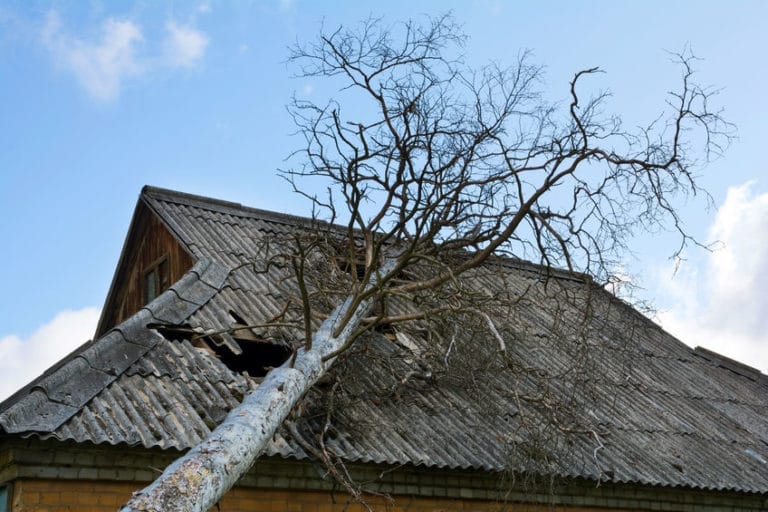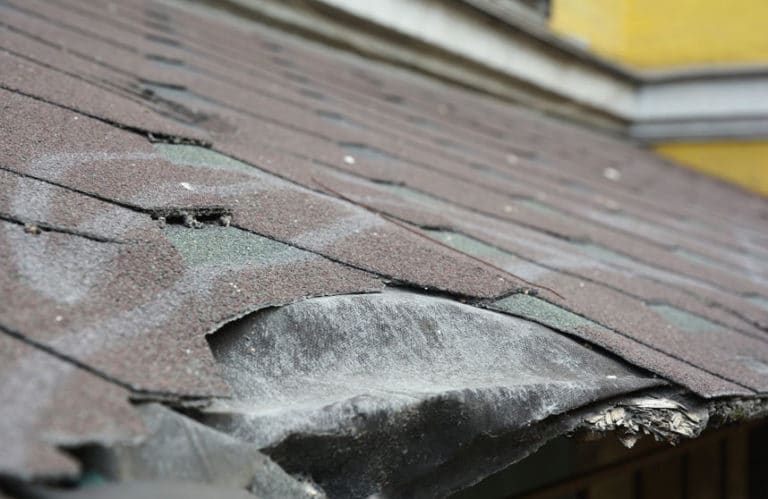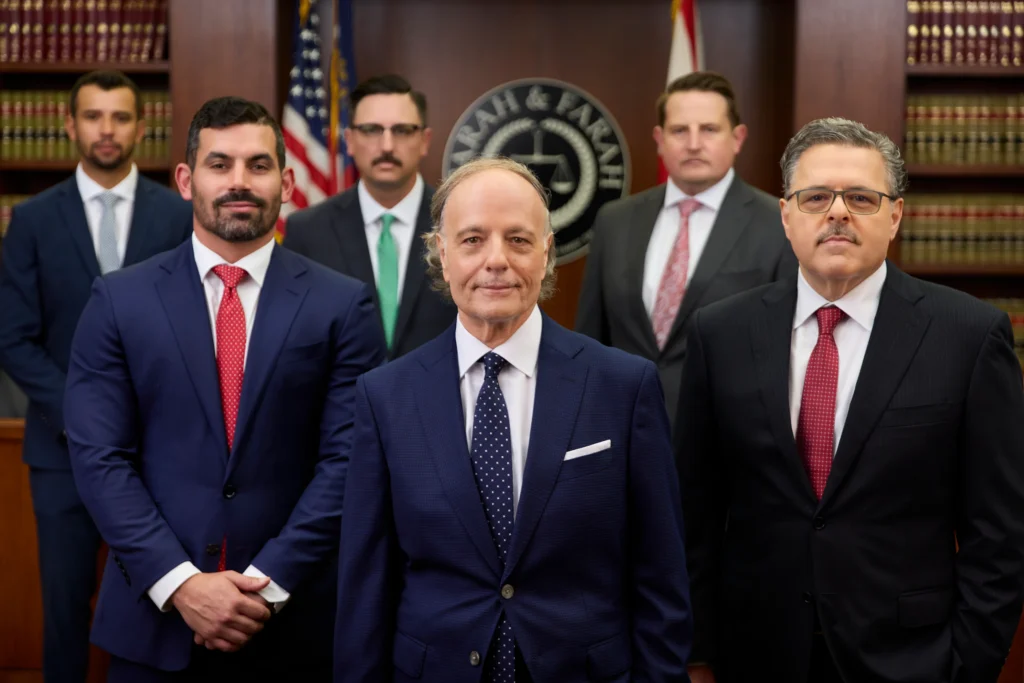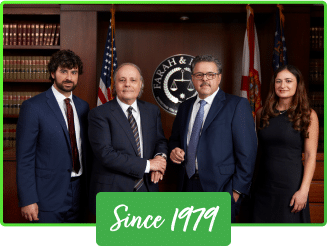Roof Damage Attorneys
Strong winds and storms can cause damage to a roof that can, if left unaddressed, result in further damage to the house. The roof of a house is designed to protect the interior from the elements, but if it is damaged, it can’t perform that function properly. Roof leaks can cause damage inside the house if they’re not caught in time. Most weather events that can cause roof damage are covered by standard homeowners’ insurance policies, although there may be exceptions.

FREE CASE REVIEW
Home > Insurance Dispute Lawyers > Property Damage Attorneys > Roof Damage Attorneys
Cases We Handle
However, insurance companies are businesses interested in making a profit. Paying out large sums of money towards roof damage insurance claims decreases the profits the insurance company can make. Therefore, some insurance companies may act unscrupulously and deny claims in bad faith in order to make money.
If your roof has suffered damage that your insurance company refused to cover, you may have a case. The roof damage lawyers at Farah & Farah can help you seek the compensation you deserve. Don’t wait to contact us for your free consultation. You won’t have to pay a thing unless your case is successful.

Causes & Types of Roof Damage
A variety of weather events, from wind and rain to hail and hurricanes, can damage a roof. Winds can knock branches or even whole trees onto a roof, causing damage or even breaching your roof. Roofs can also be damaged from within by heat, smoke, and flames from a fire or lightning strike. Even if your roof doesn’t have obvious breaches or missing areas, its structural integrity may be compromised by these types of weather events. That’s why it’s a great idea to get regular inspections, especially if you’re in an Atlantic coastal state like Florida or Georgia.
While many types of roof damage from weather events may be covered by standard homeowners insurance policies, there are some exceptions. For example, the extreme winds from a hurricane or other “named” storm may not be a covered peril in a hurricane-prone area like Florida and would instead require extra insurance coverage.
Insurance contracts can be incredibly complex, so it’s best to work with a qualified roofing attorney to determine if your losses are covered by your specific policy. If you believe that your insurance company isn’t living up to their end of the agreement, don’t hesitate to contact Farah & Farah today.
Is Roof Damage Covered By Homeowners Insurance?
Depending on the circumstances, your roof damage may be covered by homeowners insurance. What kind of roof damage is covered by insurance will typically depend on how that damage was sustained and the specific language of your policy.
Most commonly, homeowners insurance will help cover sudden, unexpected damage caused by fire, wind, and hail damage. If a tree fell onto your roof due to a storm, for example, that would often be covered by a typical homeowners insurance policy. If a hailstorm damaged your roof and caused a leak, then your policy may also cover the cost of repairing that leak.
On the other hand, your homeowners insurance is not likely to cover damage resulting from natural wear-and-tear over time – or neglectful maintenance routines. To better understand what kind of roof damage is covered by insurance, let’s take a closer look at some state regulations in Florida and Georgia:
What Is Valued Policy Law?
FLORIDA
Under Florida’s Valued Policy Law, if a home is a total loss but has been damaged by more than one peril, only one of which was covered, the insurance company may have to pay the full amount, within the limits of what the insurance policy covers, even though only a percentage of the damage was caused by the covered peril. This only applies to a total loss, however, and not to a partial loss, unless the damage was caused by fire.
GEORGIA
Georgia’s valued policy statutes apply to one or two family residential buildings that were completely destroyed by fire. The amount of insurance set forth in the policy is regarded as the value of the property. In most cases, the insurer must pay the value stated in the insurance policy, although the insurer is not prevented from repairing or replacing the property using its own funds.
What Is the Florida Building Code?
In Florida, the Building Code has a 25% rule. What this means is that if 25% or more of the roof or 25% of a roof segment needs repair, then the entire roof or segment must be replaced in order to meet the building code requirements. Because of this, homeowners in Florida may be entitled to a full replacement of a roof or segment of a roof if enough of it is damaged by a covered peril, even if the insurance policy prefers to cover repairs.
$2+ BILLION IN RESULTS

Filing A Homeowners Insurance Claim For Roof Damage
If your roof has been damaged, it’s important to make a claim with your insurance company first as soon as possible. However, contacting a qualified roofing attorney before you file your claim can often make life easier in the long run.
Working with an advocate who thoroughly understands your policy language can help you successfully file your claim in one attempt. Otherwise, you risk denial or delay in your claims process, which can be more difficult to handle – even if you contact a roofing lawyer at that point. But whether you decide to seek legal advice or not, there are some key steps you should take in the immediate aftermath of roof damage:
Assess the Damage
The first step is to assess the damage to your roof. Especially if your roof is made of tile, which can crack or chip easily if it’s stepped in, it’s a good idea to hire a professional to inspect your roof. A professional can more safely assess the damage and also will know better what to look for and can help you determine the true extent of the damage and how much it will cost to repair or whether a replacement is needed.
The insurance company, once you make the claim, will want to send someone out to inspect the damage, but that adjuster may be biased in favor of the insurance company. An independent professional inspecting the roof can help you determine the true cost of the damage and may discover damage that the insurance company adjuster didn’t.
It’s also important to photograph all damage. You’ll want to be able to prove what damage occurred. This can help you make your claim and show that the damage was caused by a covered peril.
Review Your Insurance Policy
Before making a claim, you should thoroughly review your policy. You’ll want to know exactly what damage is covered by your policy, as well as any exclusions. Does your insurance company cover the peril that damaged your roof? Does your insurance company only repair or will it also cover replacement? The Florida Building Code 25% rule may mean that the insurance company has to cover a replacement regardless.

Notify Your Insurance Company
It’s important to notify your insurance company as soon as possible that you’re making a claim. Most insurance policies will cover only the damage from the peril itself. If you delay in making the claim and getting the necessary repairs done, more damage could occur. In the case of roof damage, a leak could cause water damage inside the house if it’s not repaired in a timely manner. It is unlikely that your insurance company would cover the costs of repairing the water damage that was a result of failing to repair quickly.
Keep Maintenance Records
Insurance companies may try to deny a claim if they believe the damage was caused by a lack of maintenance. Any time you have maintenance or other work is done on your roof, whether it’s to repair the damage that’s in the claim or not, keep detailed maintenance records. This can help you prove to your insurance company that you haven’t been failing to maintain your roof properly.
For your claim, keeping records can help you prove to your insurance company what you’ve already paid for and how much it cost. This can show that you’ve met your deductible if one exists in your policy, and how much your insurance company may need to reimburse you.
What To Do If Insurance Denied Your Roof Claim
Insurance companies are businesses first and foremost. This means that they may be looking for excuses to deny claims, even if they’re valid. hile some claim denials are justified, many are done in bad faith by insurance companies looking to make a larger profit. Some common issues to be aware of include:
Disagreement About the Cause of the Damage
Because some perils are covered by your insurance policy and others are not, your insurance company may deny your claim because they say the damage was caused by something not covered by your policy. This is why it’s important to have an independent professional inspect the damage and to keep detailed records of the damage. Photographs and a professional inspection can help you prove that the damage was caused by a covered peril.
Failure to Meet Conditions
Your insurance policy may have specific requirements or conditions built into it that you have to meet in order to qualify for a claim. This may be regular maintenance, in the case of a roof. If the insurance company believes that you haven’t met the conditions of your policy, they could deny the claims.
Difference in Valuation
The insurance company may value the damage as less than what it actually is and try to pay less for it to be repaired. This is where a professional inspection will be useful. You can prove to your insurance company that the damage will cost more to repair than their estimate.
Partial Repair Instead of Replacement
Insurance companies may try to repair the roof instead of replacing it, even if a professional recommends a replacement. Thanks to the Florida Building Code’s 25% rule, however, the insurance company may be required to pay for a replacement, either of the entire roof or of a segment of the roof, depending on the extent of the damage.
If your roof damage insurance claim is denied and you don’t believe it was the correct decision, you have the right to schedule a subsequent re-inspection. Many times, claims will not be re-opened until the second or third attempt. Insurance companies understand that time is on their side, and they will try to make the process slow and laborious. When the insurance adjuster does arrive for a re-inspection, make sure you have a reputable roofing contractor there to review and document the damage alongside the adjuster.
To dispute a denied claim, you’ll need to file an appeal. Make sure you document the expected timeframe for the appeals process in writing from the insurance company, in case you need to escalate your case to the company’s superiors or a state regulatory board. And if your insurer continues to drag their feet or cause other issues, you should strongly consider enlisting the aid of a qualified roof damage insurance claim lawyer from Farah & Farah.
Roofing Lawyers in Florida & Georgia are Ready to Serve Your Insurance Dispute
Sustaining damage to your home is a very stressful situation – one where you may be eager to resolve the matter as quickly as possible. Insurance companies will often take advantage of that sense of urgency in an attempt to avoid paying out as much as they should.
If your roof has been damaged and your insurance company has denied your claim in bad faith, you may have a case. A roofing lawyer can help you understand exactly what your insurance policy was supposed to cover and any laws relevant to your claim, such as the Valued Policy Law or Florida’s Building Code 25% rule. A roof damage lawyer can also help you fight the insurance company for the money that you deserve to repair the damage to your roof.

Farah & Farah’s legal team is comprised of highly qualified and skilled roofing attorneys who are experienced with taking on insurance companies. Let us help you fight for the justice and compensation that you deserve. Contact us as soon as possible to arrange for your free consultation. You won’t have to pay anything unless your case is successful.














FREE CASE REVIEW
